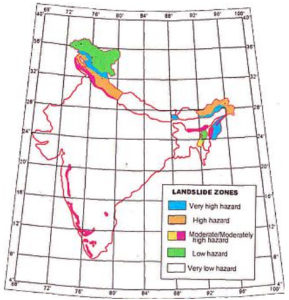Context:
A landslide in Maharashtra’s Raigad district has once again brought attention to the Dr. Madhav Gadgil report on conserving the Western Ghats.
About Gadgil Commission:
- In 2010, the Ministry of Environment appointed the Western Ghats Ecology Expert Panel (WGEEP), to be chaired by ecologist Dr Madhav Gadgil.
- Aim: To study the impact of population pressure, climate change and development activities on the Western Ghats.
About Western Ghats:
- The Western Ghats is a 1,600-km-long mountain chain running along India’s western coast.
- UNESCO has accorded the Western Ghats World Heritage status.
- It spans six Indian states: Gujarat, Maharashtra, Goa, Tamil Nadu, Karnataka, and Kerala.
- The Ghats are home to 325 globally threatened species of flora, fauna, birds, amphibians, reptiles, and fish.
- Karnataka contains about 60 percent of the entire Western Ghats.
|
Recommendations of the Dr. Madhav Gadgil report on the Western Ghats:
- Classification of Ecologically Sensitive Zones (ESZs): The report proposed classifying 64 percent of the Western Ghats, spread over six states, into three categories – ESZ 1, ESZ 2, and ESZ 3.
- Ecologically Sensitive Area (ESA): The entire Western Ghats region was recommended to be designated as an Ecologically Sensitive Area.
- Developmental Activities: The report called for a halt to almost all developmental activities like mining, construction of thermal power plants, and dams in ESZ 1.
- Bans and Restrictions: Genetically modified crops, plastic bags, Special Economic Zones, new hill stations, and changes in land use from farmland to non-farm land were to be prohibited.
- The diversion of rivers to protect the ecology of the region and conversion of public lands into private lands were also discouraged.
- Bottom-to-Top Governance: The report suggested a decentralized approach to governance with more power given to local authorities.
- It recommended the establishment of a Western Ghats Ecology Authority under the Environment (Protection) Act, 1986, to manage the region’s ecology and ensure sustainable development.
- Ban on Single Commercial Crops: The report called for a ban on growing single commercial crops like tea, coffee, cardamom, rubber, banana, and pineapple in the Western Ghats, as they had negative environmental impacts.
The Kasturirangan-led panel formulated a report as an alternative to the Gadgil Reports:
Key suggestions of the Kasturirangan panel report:
- Reduced Ecologically Sensitive Area: It has designated only 37 percent of the Western Ghats as ecologically sensitive, which was significantly lower than the 64 percent suggested by the Gadgil panel.
- Categorization of Regions: The panel split the Western Ghats into two categories – cultural regions (human settlements) and natural regions (non-human settlements).
- It proposed designating cultural lands as an Ecologically Sensitive Area (ESA).
- Categorization of Activities: The report introduced a classification of activities into three categories – red, orange, and green.
- Red Category: Activities, such as mining, stone quarrying, were recommended to be banned.
- Orange Category: Activities would be regulated and allowed with appropriate permissions.
- Green Category: All agricultural, horticultural, and certain commercial activities were allowed.
About Landslide:
- A sudden movement of rock, boulders, earth or debris down a slope is termed as a landslide.
- Natural causes that trigger it include heavy rainfall, earthquakes, snow melting and undercutting of slopes due to flooding.
Landslide Prone Regions of India:

- India is one of the top five landslide-prone countries globally, with at least one death per 100 sq km annually due to landslides.
- Excluding snow covered areas, around 12.6 % of India’s geographical land area is prone to landslides.
- 66.5 % of the landslides are reported from the North-western Himalayas,
- 18.8 % from the North-eastern Himalayas, and
- 14.7 % from the Western Ghats.
Source: NDMA
|
News Source: The Indian Express
![]() 26 Jul 2023
26 Jul 2023